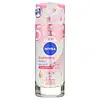What's inside
What's inside
 Key Ingredients
Key Ingredients

No key ingredients
 Benefits
Benefits

 Concerns
Concerns

 Ingredients Side-by-side
Ingredients Side-by-side

Water
Skin ConditioningAluminum Chlorohydrate
AstringentIsoceteth-20
EmulsifyingOctyldodecanol
EmollientParaffinum Liquidum
EmollientGlycerin
HumectantGlyceryl Isostearate
EmollientParfum
MaskingGlycyrrhiza Glabra Root Extract
BleachingPrunus Speciosa Flower Extract
HumectantLaminaria Ochroleuca Extract
Skin ConditioningSodium Ascorbyl Phosphate
AntioxidantPersea Gratissima Oil
Skin ConditioningCaprylic/Capric Triglyceride
MaskingPEG-150 Distearate
EmulsifyingPropylene Glycol
HumectantBetaine
HumectantPhenoxyethanol
PreservativeWater, Aluminum Chlorohydrate, Isoceteth-20, Octyldodecanol, Paraffinum Liquidum, Glycerin, Glyceryl Isostearate, Parfum, Glycyrrhiza Glabra Root Extract, Prunus Speciosa Flower Extract, Laminaria Ochroleuca Extract, Sodium Ascorbyl Phosphate, Persea Gratissima Oil, Caprylic/Capric Triglyceride, PEG-150 Distearate, Propylene Glycol, Betaine, Phenoxyethanol
Butane
Isobutane
Propane
Cyclomethicone
EmollientAluminum Chlorohydrate
AstringentIsopropyl Palmitate
EmollientParfum
MaskingHydrolyzed Pearl
Skin ConditioningPersea Gratissima Oil
Skin ConditioningOctyldodecanol
EmollientDisteardimonium Hectorite
StabilisingDimethicone
EmollientPropylene Carbonate
SolventDimethiconol
EmollientGeraniol
PerfumingBenzyl Alcohol
PerfumingIngredients Explained
These ingredients are found in both products.
Ingredients higher up in an ingredient list are typically present in a larger amount.
Aluminum Chlorohydrate has astringent, deodorant, antiperspirant, and water purifying properties.
Due to its astringent properties, this ingredient may be drying.
Aluminum chlorohydrate is one of the most common active ingredients found in antiperspirants. It works by temporarily blocking sweat ducts, reducing the amount of sweat that reaches the surface of the skin.
Despite its long history of use, rumors and misconceptions about aluminum chlorohydrate persist.
Scientific consensus and major health organizations have repeatedly concluded that aluminum chlorohydrate, when used as directed in cosmetic products like antiperspirants, is safe.
The persistent rumors connecting aluminum chlorohydrate to cancer, Alzheimer’s disease, or “toxin buildup” are not supported by credible evidence.
If you’re comfortable with aluminum-based antiperspirants, there is no scientifically backed reason to fear them.
If you prefer to avoid them, plenty of aluminum-free options exist - but that choice usually comes down to personal preference rather than proven health risks.
Learn more about Aluminum ChlorohydrateOctyldodecanol is a fatty alcohol. It is primarily used to enhance the texture of products.
As an emulsifier, Octyldodecanol helps prevent the oils and waters from separating. It also prevents ingredients from creating foam when shaken.
Octyldodecanol is created by reducing fatty acid to an alcohol.
Due to its high molecular weight, it does not get absorbed into the skin.
Learn more about OctyldodecanolParfum is a catch-all term for an ingredient or more that is used to give a scent to products.
Also called "fragrance", this ingredient can be a blend of hundreds of chemicals or plant oils. This means every product with "fragrance" or "parfum" in the ingredients list is a different mixture.
For instance, Habanolide is a proprietary trade name for a specific aroma chemical. When used as a fragrance ingredient in cosmetics, most aroma chemicals fall under the broad labeling category of “FRAGRANCE” or “PARFUM” according to EU and US regulations.
The term 'parfum' or 'fragrance' is not regulated in many countries. In many cases, it is up to the brand to define this term.
For instance, many brands choose to label themselves as "fragrance-free" because they are not using synthetic fragrances. However, their products may still contain ingredients such as essential oils that are considered a fragrance by INCI standards.
One example is Calendula flower extract. Calendula is an essential oil that still imparts a scent or 'fragrance'.
Depending on the blend, the ingredients in the mixture can cause allergies and sensitivities on the skin. Some ingredients that are known EU allergens include linalool and citronellol.
Parfum can also be used to mask or cover an unpleasant scent.
The bottom line is: not all fragrances/parfum/ingredients are created equally. If you are worried about fragrances, we recommend taking a closer look at an ingredient. And of course, we always recommend speaking with a professional.
Learn more about ParfumPersea Gratissima Oil is also known as avocado oil.
Avocado Oil has antioxidant properties. It is mostly made up of the glycerides of fatty acids. About 67% of these fatty acids is made up of oleic acid. Palmitic acid and linoleic acid are also present.
These fatty acids help hydrate and soften the skin. It may increase collagen content in the skin. Collagen helps keep your skin plump and firm. This ingredient helps reduce inflammation and has not shown to clog pores.
This ingredient may not be fungal-acne safe due to its high fatty acid content.
Avocados also have B vitamins, vitamin K, vitamin C, vitamin E, and potassium.
Learn more about Persea Gratissima Oil